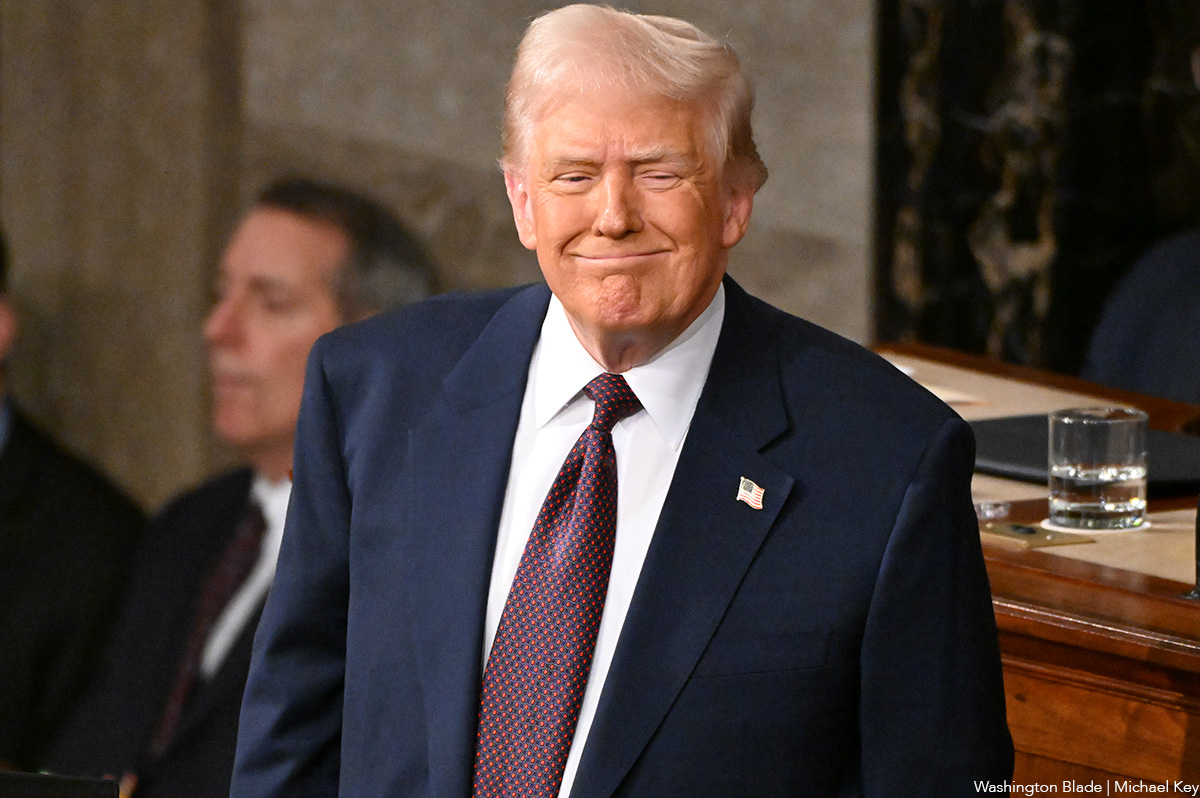National
Supreme Court rebuffs Wash. florist who refused to serve gay couple
Decade-old case appears to be at an end

The U.S. Supreme Court has rebuffed a wedding florist in Washington State who sought review of her case for a First Amendment right to refuse to serve same-sex couples.
In its orders list on Friday, the Supreme Court indicated it has denied certiorari, or refused to take up a case, in response to a petition for review from Arlene’s Flowers. The petition from the floral shop, owned by Barronelle Stutzman, is included among the denials on the orders lists without explanation or a vote tally of the justices, as is customary.
The American Civil Liberties Union, which had represented Robert Ingersoll and Curt Freed, the same-sex couple denied service in 2013 at the floral shop for their wedding, declared victory as a result of the Supreme Court’s action.
“Planning a wedding was a joyful time for Rob and Curt until they were refused service at their local flower shop,” Ria Tabacco Mar, an ACLU lawyer representing the couple and the director of the ACLU Women’s Rights Project,” said in a statement. “No one should walk into a store and have to wonder whether they will be turned away because of who they are. Preventing that kind of humiliation and hurt is exactly why we have nondiscrimination laws.”
The Washington State Supreme Court found in 2017 Stutzman violated the Washington Law Against Discrimination, a state law that prohibits discrimination against LGBTQ people in public accommodations, ordering her to pay a fine of $1,000.
It’s the second petition from Arlene’s Flowers before the U.S. Supreme Court. Stutzman has twice sought from justices review of her case, asserting her penalty under the Washington State law contravened her rights to freedom of religion and freedom of speech under the First Amendment.
As a result of her first petition, the U.S. Supreme Court vacated the Washington State Supreme Court decision and remanded for review before the Washington State Supreme Court in light of the limited decision in the Masterpiece Cakeshop case. The Washington State Supreme Court, however, reaffirmed the decision it had reached earlier and upheld the $1,000 fine against Stutzman, who subsequent filed another petition before the U.S. Supreme Court.
The latest petition from Arlene’s Flowers has been pending before the Supreme Court for some time. Alliance Defending Freedom, a law firm that sought to undermine LGBTQ rights in the name of religious freedom, had made the legal filing before the court in 2019, so the petition has been pending for two years.
Kristen Waggoner, general counsel for Alliance Defending Freedom, said in a statement in the aftermath of the U.S. Supreme Court’s refusal to hear the case the decision was “tragic.”
“Although the outcome of this case is tragic, the critical work of protecting the First Amendment freedoms of all Americans must continue,” Waggoner said. “No one should be forced to express a message or celebrate an event they disagree with. A government that can crush someone like Barronelle, who kindly served her gay customer for nearly a decade but simply declined to create art celebrating one sacred ceremony, can use its power to crush any of us regardless of our political ideology or views on important issues like marriage.”
It’s hard to see, however, where Alliance Defending Freedom can go with this case at this point, if anywhere. The course of the litigation appears to be complete.
State Department
Rubio mum on Hungary’s Pride ban
Lawmakers on April 30 urged secretary of state to condemn anti-LGBTQ bill, constitutional amendment

More than 20 members of Congress have urged Secretary of State Marco Rubio to publicly condemn a Hungarian law that bans Pride events.
California Congressman Mark Takano, a Democrat who co-chairs the Congressional Equality Caucus, and U.S. Rep. Bill Keating (D-Mass.), who is the ranking member on the House Foreign Affairs Committee’s Europe Subcommittee, spearheaded the letter that lawmakers sent to Rubio on April 30.
Hungarian lawmakers in March passed a bill that bans Pride events and allow authorities to use facial recognition technology to identify those who participate in them. MPs last month amended the Hungarian constitution to ban public LGBTQ events.
“As a NATO ally which hosts U.S. service members, we expect the Hungarian government to abide by certain values which underpin the historic U.S.-Hungary bilateral relationship,” reads the letter. “Unfortunately, this new legislation and constitutional amendment disproportionately and arbitrarily target sexual and gender minorities.”
Prime Minister Viktor Orbán’s government over the last decade has moved to curtail LGBTQ and intersex rights in Hungary.
A law that bans legal recognition of transgender and intersex people took effect in 2020. Hungarian MPs that year also effectively banned same-sex couples from adopting children and defined marriage in the constitution as between a man and a woman.
An anti-LGBTQ propaganda law took effect in 2021. The European Commission sued Hungary, which is a member of the European Union, over it.
MPs in 2023 approved the “snitch on your gay neighbor” bill that would have allowed Hungarians to anonymously report same-sex couples who are raising children. The Budapest Metropolitan Government Office in 2023 fined Lira Konyv, the country’s second-largest bookstore chain, 12 million forints ($33,733.67), for selling copies of British author Alice Oseman’s “Heartstopper.”
Former U.S. Ambassador to Hungary David Pressman, who is gay, participated in the Budapest Pride march in 2024 and 2023. Pressman was also a vocal critic of Hungary’s anti-LGBTQ crackdown.
“Along with years of democratic backsliding in Hungary, it flies in the face of those values and the passage of this legislation deserves quick and decisive criticism and action in response by the Department of State,” reads the letter, referring to the Pride ban and constitutional amendment against public LGBTQ events. “Therefore, we strongly urge you to publicly condemn this legislation and constitutional change which targets the LGBTQ community and undermines the rights of Hungarians to freedom of expression and peaceful assembly.”
U.S. Reps. Pramila Jayapal (D-Wash.), Sarah McBride (D-Del.), Jim Costa (D-Calif.), James McGovern (D-Mass.), Gerry Connolly (D-Va.), Summer Lee (D-Pa.), Joaquin Castro (D-Texas), Julie Johnson (D-Texas), Ami Bera (D-Calif.), Mark Pocan (D-Wis.), Lloyd Doggett (D-Texas), Becca Balint (D-Vt.), Gabe Amo (D-R.I.), Ted Lieu (D-Calif.), Robert Garcia (D-Calif.), Dina Titus (D-Nev.), Raja Krishnamoorthi (D-Ill.), Jan Schakowsky (D-Ill.) and Mike Quigley (D-Ill.) and Del. Eleanor Holmes Norton (D-D.C.) signed the letter alongside Takano and Keating.
A State Department spokesperson on Wednesday declined to comment.
Federal Government
HRC memo details threats to LGBTQ community in Trump budget
‘It’s a direct attack on LGBTQ+ lives’

A memo issued Monday by the Human Rights Campaign details threats to LGBTQ people from the “skinny” budget proposal issued by President Donald Trump on May 2.
HRC estimates the total cost of “funding cuts, program eliminations, and policy changes” impacting the community will exceed approximately $2.6 billion.
Matthew Rose, the organization’s senior public policy advocate, said in a statement that “This budget is more than cuts on a page—it’s a direct attack on LGBTQ+ lives.”
“Trump is taking away life-saving healthcare, support for LGBTQ-owned businesses, protections against hate crimes, and even housing help for people living with HIV,” he said. “Stripping away more than $2 billion in support sends one clear message: we don’t matter. But we’ve fought back before, and we’ll do it again—we’re not going anywhere.”
Proposed rollbacks or changes at the U.S. Department of Health and Human Services will target the Ryan White HIV/AIDS Program, other programs related to STI prevention, viral hepatitis, and HIV, initiatives housed under the Substance Abuse and Mental Health Services Administration, and research by the National Institutes of Health and Agency for Healthcare Research and Quality.
Other agencies whose work on behalf of LGBTQ populations would be jeopardized or eliminated under Trump’s budget include the U.S. Department of Housing and Urban Development, the U.S. Department of Justice, the U.S. Small Business Administration, and the U.S. Department of Education.
U.S. Supreme Court
Supreme Court allows Trump admin to enforce trans military ban
Litigation challenging the policy continues in the 9th Circuit

The U.S. Supreme Court on Tuesday allowed the Trump-Vance administration to enforce a ban on transgender personnel serving in the U.S. Armed Forces pending the outcome of litigation challenging the policy.
The brief order staying a March 27 preliminary injunction issued by the U.S. District Court for the Western District of Washington notes the dissents from liberal Justices Sonia Sotomayor, Elena Kagan, and Ketanji Brown Jackson.
On the first day of his second term, President Donald Trump issued an executive order requiring Secretary of Defense Pete Hegseth to effectuate a ban against transgender individuals, going further than efforts under his first administration — which did not target those currently serving.
The DoD’s Feb. 26 ban argued that “the medical, surgical, and mental health constraints on individuals who have a current diagnosis or history of, or exhibit symptoms with, gender dysphoria are incompatible with the high mental and physical standards necessary for military service.”
The case challenging the Pentagon’s policy is currently on appeal before the U.S. Court of Appeals for the Ninth Circuit. The lead plaintiff is U.S. Navy Commander Emily Shilling, who is joined in the litigation by other current transgender members of the armed forces, one transgender person who would like to join, and a nonprofit whose members either are transgender troops or would like to be.
Lambda Legal and the Human Rights Campaign Foundation, both representing the plaintiffs, issued a statement Tuesday in response to the Supreme Court’s decision:
“Today’s Supreme Court ruling is a devastating blow to transgender servicemembers who have demonstrated their capabilities and commitment to our nation’s defense.
“By allowing this discriminatory ban to take effect while our challenge continues, the Court has temporarily sanctioned a policy that has nothing to do with military readiness and everything to do with prejudice.
“Transgender individuals meet the same standards and demonstrate the same values as all who serve. We remain steadfast in our belief that this ban violates constitutional guarantees of equal protection and will ultimately be struck down.”
U.S. Solicitor General D. John Sauer noted that courts must show “substantial deference” to DoD decision making on military issues.
“The Supreme Court’s decision to allow the military ban to go into effect is devastating for the thousands of qualified transgender servicemembers who have met the standards and are serving honorably, putting their lives on the line for their country every single day,” said GLAD Law Senior Director of Transgender and Queer Rights Jennifer Levi. “Today’s decision only adds to the chaos and destruction caused by this administration. It’s not the end of the case, but the havoc it will wreak is devastating and irreparable. History will confirm the weight of the injustice done today.”
“The Court has upended the lives of thousands of servicemembers without even the decency of explaining why,” said NCLR Legal Director Shannon Minter. “As a result of this decision, reached without benefit of full briefing or argument, brave troops who have dedicated their lives to the service of our country will be targeted and forced into harsh administrative separation process usually reserved for misconduct. They have proven themselves time and time again and met the same standards as every other soldier, deploying in critical positions around the globe. This is a deeply sad day for our country.”
Levi and Minter are the lead attorneys in the first two transgender military ban cases to be heard in federal court, Talbott v. Trump and Ireland v. Hegseth.
U.S. Rep. Mark Takano (D-Calif.) issued a statement on behalf of the Congressional Equality Caucus, where he serves as chair.
“By lifting the lower court’s preliminary injunction and allowing Trump to enforce his trans troop ban as litigation continues, the Supreme Court is causing real harm to brave Americans who simply want to serve their nation in uniform.
“The difference between Donald Trump, a draft dodger, and the countless brave Americans serving their country who just happen to be trans couldn’t be starker. Let me be clear: Trump’s ban isn’t going to make our country safer—it will needlessly create gaps in critical chains of military command and actively undermine our national security.
“The Supreme Court was absolutely wrong to allow this ban to take effect. I hope that lower courts move swiftly so this ban can ultimately be struck down.”
SPARTA Pride also issued a statement:
“The Roberts Court’s decision staying the preliminary injunction will allow the Trump purge of transgender service members from the military to proceed.
“Transgender Americans have served openly, honorably, and effectively in the U.S. Armed Forces for nearly a decade. Thousands of transgender troops are currently serving, and are fully qualified for the positions in which they serve.
“Every court up to now has found that this order is unconstitutional. Nevertheless, the Roberts Court – without hearing any evidence or argument – decided to allow it to go forward. So while the case continues to be argued, thousands of trans troops will be purged from the Armed Forces.
“They will lose their jobs. They will lose their commands, their promotions, their training, pay and benefits, and time. Their units will lose key players; the mission will be disrupted. This is the very definition of irreparable harm.”
Imara Jones, CEO of TransLash Media, issued the following statement:
“The Supreme Court’s decision to uphold Trump’s ban on transgender soldiers in the military, even as the judicial process works its way through the overall question of service, signals that open discrimination against trans people is fair game across American society.
“It will allow the Trump Administration to further advance its larger goal of pushing trans people from mainstream society by discharging transgender military members who are currently serving their country, even at a time when the military has struggled recently to meet its recruiting goals.
“But even more than this, all of my reporting tells me that this is a further slide down the mountain towards authoritarianism. The hard truth is that governments with authoritarian ambitions have to separate citizens between who is worthy of protection and who’s not. Trans people are clearly in the later category. And this separation justifies the authoritarian quest for more and more power. This appears to be what we are witnessing here and targeting trans people in the military is just a means to an end.”















